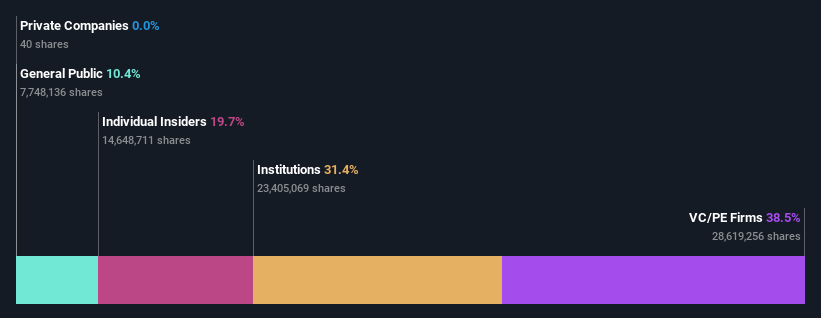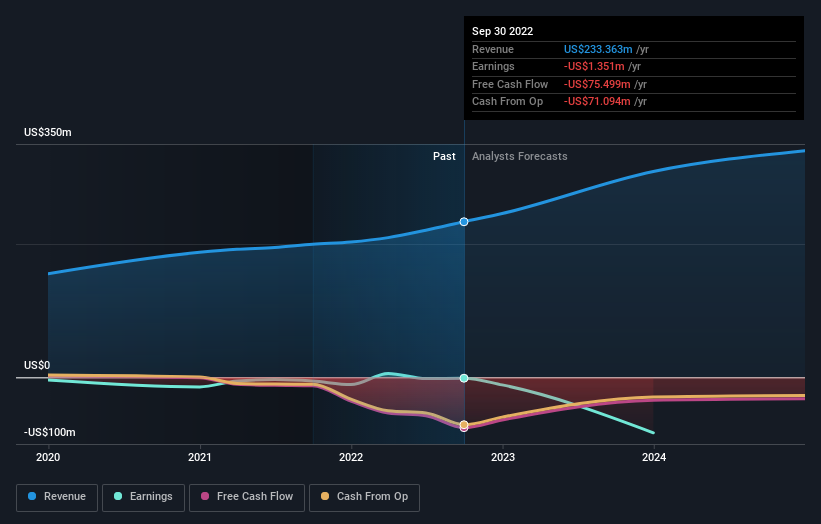The Oncology Institute, Inc. (NASDAQ:TOI) surges 19%; private equity firms who own 38% shares profited along with institutions
Every investor in The Oncology Institute, Inc. (NASDAQ:TOI) should be aware of the most powerful shareholder groups. And the group that holds the biggest piece of the pie are private equity firms with 38% ownership. In other words, the group stands to gain the most (or lose the most) from their investment into the company.
Following a 19% increase in the stock price last week, private equity firms profited the most, but institutions who own 31% stock also stood to gain from the increase.
Let's delve deeper into each type of owner of Oncology Institute, beginning with the chart below.
Check out our latest analysis for Oncology Institute
What Does The Institutional Ownership Tell Us About Oncology Institute?
Institutions typically measure themselves against a benchmark when reporting to their own investors, so they often become more enthusiastic about a stock once it's included in a major index. We would expect most companies to have some institutions on the register, especially if they are growing.
As you can see, institutional investors have a fair amount of stake in Oncology Institute. This implies the analysts working for those institutions have looked at the stock and they like it. But just like anyone else, they could be wrong. If multiple institutions change their view on a stock at the same time, you could see the share price drop fast. It's therefore worth looking at Oncology Institute's earnings history below. Of course, the future is what really matters.
Oncology Institute is not owned by hedge funds. The company's largest shareholder is M33 Growth, LLC, with ownership of 21%. With 18% and 16% of the shares outstanding respectively, Havencrest Capital Management, LLC and FMR LLC are the second and third largest shareholders.
After doing some more digging, we found that the top 3 shareholders collectively control more than half of the company's shares, implying that they have considerable power to influence the company's decisions.
While studying institutional ownership for a company can add value to your research, it is also a good practice to research analyst recommendations to get a deeper understand of a stock's expected performance. There is a little analyst coverage of the stock, but not much. So there is room for it to gain more coverage.
Insider Ownership Of Oncology Institute
The definition of an insider can differ slightly between different countries, but members of the board of directors always count. Management ultimately answers to the board. However, it is not uncommon for managers to be executive board members, especially if they are a founder or the CEO.
Insider ownership is positive when it signals leadership are thinking like the true owners of the company. However, high insider ownership can also give immense power to a small group within the company. This can be negative in some circumstances.
Our most recent data indicates that insiders own a reasonable proportion of The Oncology Institute, Inc.. Insiders have a US$25m stake in this US$127m business. This may suggest that the founders still own a lot of shares. You can click here to see if they have been buying or selling.
General Public Ownership
The general public, who are usually individual investors, hold a 10% stake in Oncology Institute. This size of ownership, while considerable, may not be enough to change company policy if the decision is not in sync with other large shareholders.
Private Equity Ownership
With a stake of 38%, private equity firms could influence the Oncology Institute board. Some investors might be encouraged by this, since private equity are sometimes able to encourage strategies that help the market see the value in the company. Alternatively, those holders might be exiting the investment after taking it public.
Next Steps:
I find it very interesting to look at who exactly owns a company. But to truly gain insight, we need to consider other information, too. Be aware that Oncology Institute is showing 3 warning signs in our investment analysis , and 1 of those is significant...
If you are like me, you may want to think about whether this company will grow or shrink. Luckily, you can check this free report showing analyst forecasts for its future.
NB: Figures in this article are calculated using data from the last twelve months, which refer to the 12-month period ending on the last date of the month the financial statement is dated. This may not be consistent with full year annual report figures.
Have feedback on this article? Concerned about the content? Get in touch with us directly. Alternatively, email editorial-team (at) simplywallst.com.
This article by Simply Wall St is general in nature. We provide commentary based on historical data and analyst forecasts only using an unbiased methodology and our articles are not intended to be financial advice. It does not constitute a recommendation to buy or sell any stock, and does not take account of your objectives, or your financial situation. We aim to bring you long-term focused analysis driven by fundamental data. Note that our analysis may not factor in the latest price-sensitive company announcements or qualitative material. Simply Wall St has no position in any stocks mentioned.
Join A Paid User Research Session
You’ll receive a US$30 Amazon Gift card for 1 hour of your time while helping us build better investing tools for the individual investors like yourself. Sign up here


